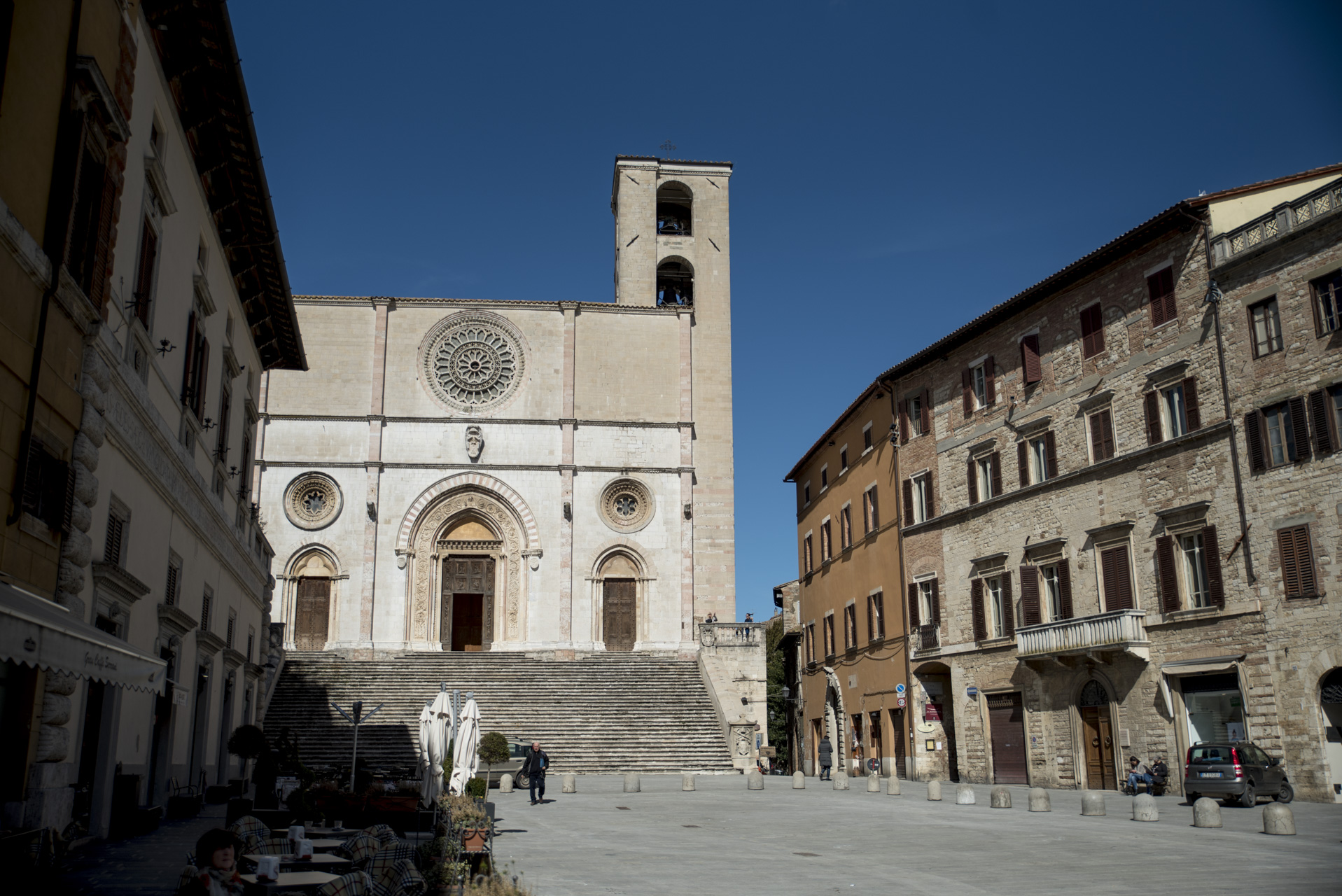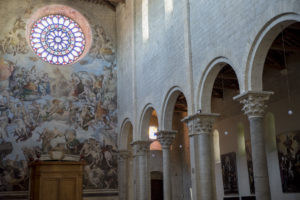The Cathedral of Todi – which is also the co-cathedral of the diocese of Orvieto-Todi, following the union, in 1986, of the two original episcopal seats – also known as the Duomo of Todi, takes its name from Maria Santissima Annunziata and was built between the twelfth and fourteenth centuries.
It is situated in the amazing Piazza del Popolo alongside the buildings of the town hall – Palazzo del Capitano and Palazzo del Popolo – across from Palazzo dei Priori.
One can therefore admire the splendour of its façade from the city’s main square: it dates back to the thirteenth century, but was modified many times, the last time being in the 1500s.
Its most distinguishing feature is the fine central rose window, which also dates back to the sixteenth century. The glass, however, was replaced in the 1800s when the entire building was restored. The portal features a pointed arch and several decorative panels, with the main one composed of spirals of acanthi and culminating in the figure of Blessing Christ.
The engraved wooden door dates back to 1521, by Antonio Bencivenni da Mercatello who also made the four top panels depicting the Annunciation, Archangel Gabriel, Saint Peter and Saint Paul. The six original lower panels on the other hand, were damaged and were replaced, during the 1600s, with the current ones created by Carlo Lorenti.
On the right side there is the bell tower, most likely dating back to the 1200s: is has a square design, and in 1951 the 19th century octagonal spire was demolished, mainly to maintain stability, given the heavy weight of the superstructure which posed a risk to the stability of the entire bell tower.
The church is accessed from its broad and beautiful steps: 29 steps, from the top of which one can enjoy the best view of Piazza del Popolo.
A secondary entrance is located to the left of the church, with access from the short adjacent climb, leading to the Palazzo Vescovile (Bishop’s Building).
We suggest taking this route even if only to admire the church from the outside, with the majestic side façade that competes with the beauty of the right one, and with the rear one which creates a perfect setting for the external part of the apse: we therefore highly recommend a walk along via del Duomo and via del Vescovado also to discover the monstrous figures decor.
You are sure to experience amazement and marvel when entering the Cathedral of Todi for the first time. It is built on a Latin cross design, and the interior is divided into four naves, with the central one being the largest and tallest.
The three main naves are separated by arcades characterised by Corinthian columns connected by round arches. A fourth nave, the smallest, runs alongside the right side one, divided by smaller columns and pointed arches.
To the left of the presbytery is the Cesi Chapel, commissioned by Bishop Angelo Cesi, with a vault embellished with frescoes by Ferraù da Faenza, also known as il Faenzone, also the author of the amazing fresco on the counterfaçade, depicting the Last Judgement.
To the right of the altar, on the other hand, a staircase and a long corridor lead to the crypt. Along it one can admire a fine collection of sacred art originating from the Cathedral itself and partly from other churches in the area.
The crypt was mainly used for the burial of the bishops of the Todi diocese and now hosts marble masterpieces by Giovanni Pisano – Virgin with Child and Angel leading the Bishop – and the sculptor Rubeus – Saint – which previously decorated the façade of the Duomo.
Opening hours
| Monday – Saturday spring/summer | 8:00 – 13:00 / 15:30 – 18:30 |
| Sunday spring/summer | 8:30 – 13:00 / 15:00 – 19:00 |
| Monday – Saturday autumn/winter | 8:30 – 13:00 / 13:30 – 16:30 |
| Sunday autumn/winter | 8:30 – 13:00 / 15:00 – 18:00 |












Follow us on the socials